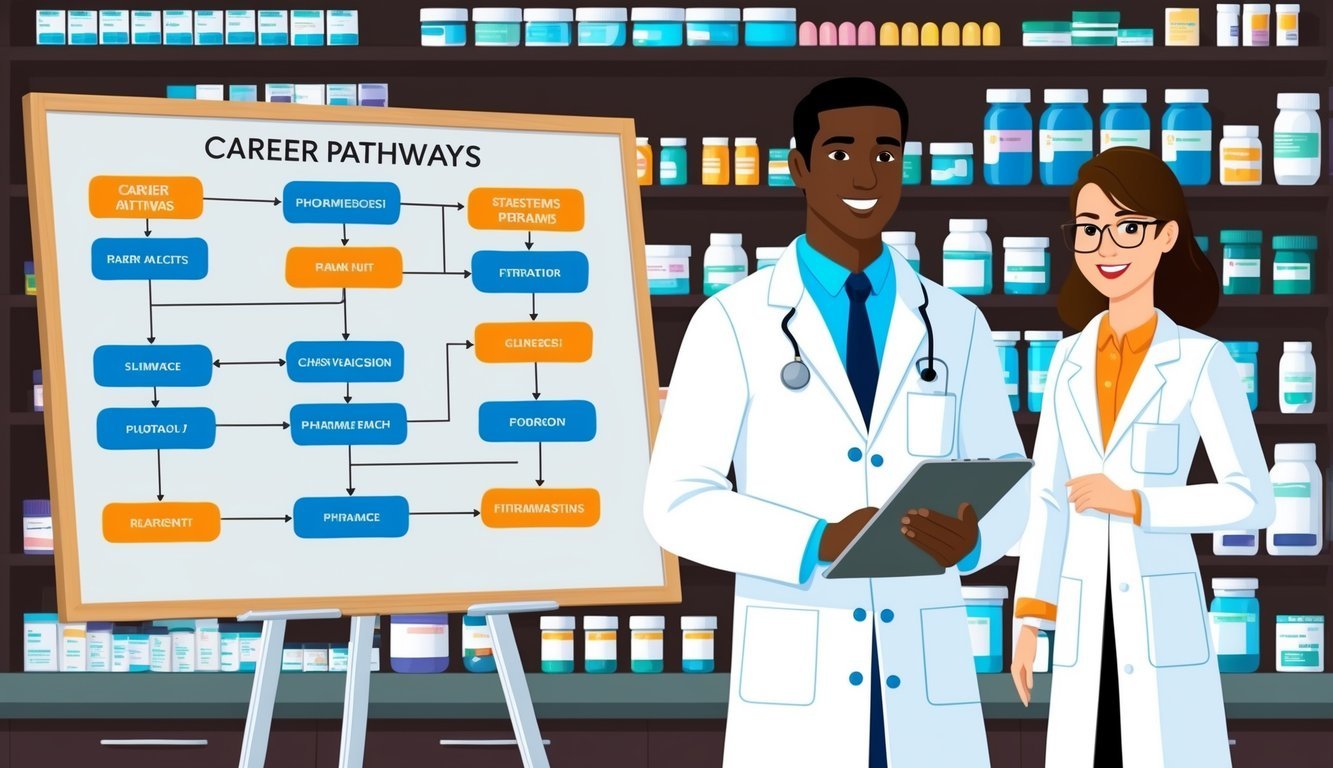Accelerated pharmacy programs have become increasingly popular for those looking to fast-track their education and enter the pharmacy field sooner. These programs allow you to earn your Doctor of Pharmacy (PharmD) degree in three years or less, providing a valuable opportunity for students eager to start their careers in pharmacy.
With a streamlined curriculum and intensive coursework, you can dive deeply into pharmacy practice and gain essential skills more quickly than traditional routes.
The journey into these programs requires careful consideration of admission requirements, academic schedules, and the specifics of the curriculum.
Not only will you gain the clinical knowledge needed for patient care, but you’ll also be well-prepared for various career pathways in the healthcare industry, including roles as pharmacists, researchers, and educators.
As you explore your options, you will find various institutions offering unique programs that cater to different needs and goals.
Key Takeaways
- Accelerated PharmD programs can significantly shorten your time in school.
- Admission requirements and curricula vary by institution, so research is essential.
- A PharmD degree opens doors to a wide range of career opportunities in healthcare.
Exploring Accelerated PharmD Programs
Accelerated PharmD programs allow you to earn your Doctor of Pharmacy degree in a shorter time frame compared to traditional routes.
These programs are structured to provide an intensive pharmacy curriculum that prepares you for a successful career in pharmacy.
Definition and Structure
An accelerated PharmD program is designed to be completed in about three years, unlike the typical four-year timeline.
This fast-paced curriculum often includes summer terms and year-round classes, allowing you to cover essential topics quickly.
Most programs combine classroom learning with hands-on experiences.
You will study subjects like pharmacology, pharmaceutical chemistry, and pharmacy law.
Some schools also emphasize team-based learning and early patient interaction, providing real-world experience in various settings.
Here’s a table of common features in accelerated PharmD programs:
| Aspect | Details |
|---|---|
| Program Length | Approximately 3 years |
| Class Format | Year-round, including summer terms |
| Learning Style | Active and team-based learning |
| Key Subjects | Pharmacology, Pharmacy Law, Patient Care |
Benefits of Accelerated Pathways
Choosing an accelerated pathway can offer several advantages.
One significant benefit is time savings.
You can enter the workforce sooner, which can lead to earlier earnings in the pharmacy field.
Additionally, the intensive nature of these programs can foster strong relationships with faculty and peers.
This close-knit environment may enhance your learning experience.
Financially, completing your degree in less time can reduce tuition costs and living expenses.
Furthermore, some programs offer scholarships, which may ease the financial burden.
Overall, an accelerated PharmD program equips you with the knowledge and experience needed to succeed in your pharmacy career faster than traditional programs.
For more detailed information on various programs, you can visit sites like MCPHS and Roseman University.
Admission Requirements and Process
To gain admission into an accelerated pharmacy program, you must navigate several key steps.
This includes completing prerequisite coursework, submitting your PharmCAS application, and being mindful of important deadlines.
Prerequisite Coursework
Before applying, you need to complete specific prerequisite courses.
These typically include:
- General Chemistry: Two semesters with lab work
- Organic Chemistry: Two semesters with lab work
- Calculus: One course
- English Composition: At least one course
Many programs require a minimum grade of “C-” in these courses to ensure you are prepared for the rigorous coursework ahead.
Some schools may also accept Advanced Placement (AP) credits.
Be sure to check each program’s specific requirements, as they can differ.
Keeping track of your college credits is crucial for meeting these prerequisites.
PharmCAS Application
Most accelerated pharmacy programs use the PharmCAS system for applications.
This centralized application service allows you to submit your materials to multiple schools at once.
Your PharmCAS application should include:
- Academic transcripts
- Letters of recommendation
- A personal statement
Make sure your transcripts reflect all completed courses and grades.
You will need to register on the PharmCAS website to start.
Pay attention to any specific instructions set by your target programs to ensure your application is complete.
Key Deadlines and PCAT
Each pharmacy program has its application deadlines.
Generally, early action deadlines for fall admission may fall around May 1 for priority applications.
Regular deadlines can extend into June.
Some programs may require the Pharmacy College Admission Test (PCAT).
Check whether the schools you are interested in require this test and what minimum scores they expect.
Be proactive in scheduling your PCAT, as scores may take several weeks to process.
Staying organized with deadlines and requirements will increase your chances of successful admission into an accelerated pharmacy program.
Curriculum and Academic Schedule
In accelerated pharmacy programs, the curriculum is designed to cover essential topics efficiently.
You’ll encounter a mix of core courses, experiential learning opportunities, and specialized programs to ensure you are well-prepared for a career in pharmacy.
Core and Elective Courses
The PharmD curriculum includes both core and elective courses tailored to build your knowledge in key areas.
You will take foundational classes such as:
- Pharmaceutical Chemistry
- Pharmacology
- Pharmacy Law
- Pharmaceutics
Elective courses allow you to explore options like health economics and statistics.
This blend enables you to gain a well-rounded understanding of pharmacy practice and its role within healthcare.
Many programs require completion of around 139 total credits, with structured semesters that often span over three years or less, depending on the program’s pace.
For specific courses, the MCPHS curriculum provides further details.
Experiential Learning Components
Experiential learning is a critical part of your education.
Programs often integrate internships and clinical rotations to expose you to real-world healthcare settings.
You might engage in activities such as:
- Direct patient care
- Community pharmacy practice
- Hospital pharmacy settings
These experiences help you apply classroom knowledge in practical environments.
Developing hands-on skills in diverse situations prepares you for real-life challenges in the pharmacy field.
Early exposure to patient interactions and team-based environments enhances your learning and builds confidence in your abilities.
Acceleration of Studies
In many accelerated programs, the pace is designed to allow you to complete your PharmD in three years or less.
The curriculum is delivered in an efficient block format.
You’ll participate in year-round classes throughout the summer and fall/spring semesters.
Each semester consists of condensed courses lasting six weeks.
This fast-tracked approach means you can receive your degree sooner while still meeting all educational requirements.
Programs typically balance rigorous coursework with practical experiences to ensure a comprehensive education without sacrificing depth.
Early Assurance Program
Some schools offer an Early Assurance Program for students who meet specific criteria.
This option allows you to secure your place in the PharmD program before completing your undergraduate degree.
You will often need to maintain a certain GPA and complete prerequisite coursework in areas like physics and biology.
This path helps streamline your educational journey, ensuring that you are ready to start pharmacy training right after your initial studies.
By committing early, you can focus on fulfilling the requirements necessary for your pharmacy education without the stress of reapplying later.
Institutional Examples
In this section, you will find specific examples of institutions that offer accelerated pharmacy programs.
These programs are designed to help you earn your Doctor of Pharmacy (PharmD) degree quickly while maintaining a strong educational foundation.
Medical College of Wisconsin
The Medical College of Wisconsin offers a unique program for students pursuing their PharmD.
Their accelerated pathway allows you to complete the degree in three years.
The curriculum focuses on patient-centered care and integrates innovative teaching methods.
Key features include:
- Curriculum: Combines clinical and laboratory experience.
- Admissions: Competitive process with early applications encouraged.
- Locations: Classes are held in Milwaukee, providing exposure to a diverse patient population.
For more information, visit their official site.
Manchester Campus
The Manchester Campus is known for its comprehensive approach to pharmacy education.
They provide an accelerated PharmD program designed to be completed in three years, allowing you to enter the workforce sooner.
The program highlights include:
- Experiential Learning: Emphasizes practical, hands-on experience.
- Faculty Support: Access to dedicated faculty mentors.
- Community Engagement: Opportunities to serve in local health initiatives.
Interested individuals can learn more by checking their program details.
Roseman University
Roseman University offers a three-year Doctor of Pharmacy (PharmD) program that focuses on team-based learning.
You can learn in a supportive environment, with campuses located in Henderson, Nevada, and South Jordan, Utah.
Notable aspects of Roseman’s program are:
- Active Learning: Encourages collaboration and real-world applications.
- Dual Degree Options: You can pursue additional degrees alongside your PharmD.
- Early Patient Experiences: Engages students in patient care early in their studies.
For additional details, visit the Roseman University website.
Career Pathways with a Doctor of Pharmacy

With a Doctor of Pharmacy (PharmD) degree, you can explore various career opportunities.
The field of pharmacy offers distinct pathways in clinical settings, research, and the industry.
Each pathway presents unique roles that can shape your professional journey.
Clinical Settings
In clinical settings, you play an essential role as a patient care provider.
You may work in hospitals, community pharmacies, or outpatient clinics.
Responsibilities include:
- Medication Management: You ensure patients take their medications correctly and understand potential side effects.
- Collaborative Care: You work alongside doctors and nurses to design safe and effective medication plans for patients.
- Patient Education: Communication is vital as you inform patients about their treatments and health conditions.
You can choose to specialize in areas such as pediatrics, geriatrics, or oncology.
Each specialty requires specific skills and knowledge, enhancing the quality of care for patients.
Research and Academia
PharmD graduates also contribute to research and academic settings.
In this role, you can engage in drug development, clinical trials, and teaching future pharmacists.
Key aspects include:
- Conducting Research: You might explore new therapies or improve existing ones. Collaborating with pharmaceutical companies or academic institutions can lead to significant advancements.
- Teaching: You can share your knowledge as a professor or lecturer, shaping the next generation of pharmacy professionals.
- Publishing: Contributing to scientific journals elevates your professional status and helps disseminate important findings.
Research and academia provide opportunities to impact public health while nurturing future practitioners.
Industry and Regulatory Politics
In the industry, you can work in pharmaceutical companies or governmental agencies.
Your role may involve:
- Drug Development: You help develop new medications as a part of a team. This includes working from the lab to formulation.
- Regulatory Affairs: You ensure compliance with safety and efficacy regulations set by organizations like the FDA.
- Policy Advocacy: Engaging in advocacy work allows you to influence healthcare policies affecting pharmacy practice.
These roles often require strong analytical and communication skills, as you balance business needs with patient safety.
Each of these pathways allows you to use your PharmD in meaningful ways, shaping both your career and community health outcomes.
Frequently Asked Questions

This section addresses common questions regarding accelerated pharmacy programs.
It covers various topics like the best programs, finding schools near you, online options, duration, differences from traditional programs, and specific offerings in Kentucky.
What are the best accelerated PharmD programs available?
Some of the top accelerated PharmD programs include those at the University of California San Francisco and the Medical College of Wisconsin.
These programs allow you to earn your degree in three years, focusing on comprehensive pharmacy education.
How do I find accelerated pharmacy programs near my location?
To find accelerated pharmacy programs near you, search online for local universities that offer pharmacy degrees.
Websites like the American Association of Colleges of Pharmacy can provide relevant information on institutions and their programs.
Can I complete an accelerated pharmacy program online, and how credible are they?
Yes, some accelerated pharmacy programs offer online options.
These programs are designed to meet accreditation standards, ensuring credibility.
Always check the accreditation status of the program to ensure it meets professional requirements.
What is the typical duration of an accelerated pharmacy program?
Most accelerated pharmacy programs take about three years to complete.
Some schools, like those that offer a BS/MS in Pharmaceutical Sciences, may have different durations, often around five years.
How do 0-6 pharmacy programs differ from traditional PharmD programs?
0-6 pharmacy programs allow you to enter directly from high school and complete both your undergraduate and PharmD degrees in a shortened time frame.
In contrast, traditional PharmD programs require you to complete a bachelor’s degree before applying.
Are there pharmacy schools in Kentucky offering accelerated PharmD programs?
Yes, pharmacy schools in Kentucky offer accelerated PharmD programs.
Research institutions like the University of Kentucky College of Pharmacy for specific options and program details tailored to your educational goals.

